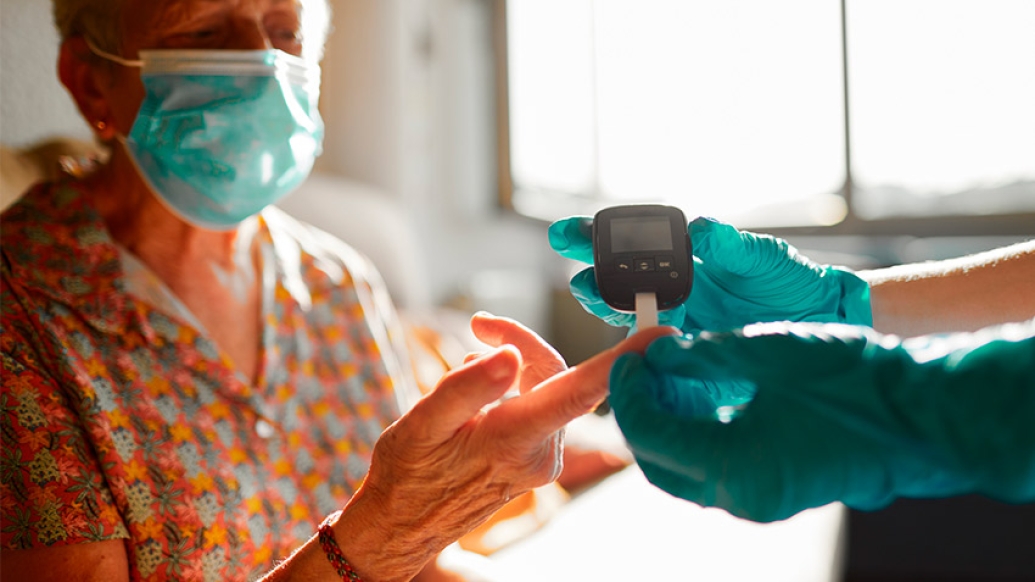A new study reveals the mechanism behind cytokine storm during coronavirus infection.
2:59 PM
Author |

Throughout the COVID-19 pandemic, clinicians have noted that certain patients are at especially high risk of developing severe illness or dying from coronavirus infection. Type 2 diabetes—a condition affecting more than 10 percent of the U.S. population—is one of the main risk factors for severe COVID-19 illness. New research from U-M uncovers why this might be and offers hope for a potential therapy.
The culprit appears to be an enzyme called SETDB2. This same enzyme has been implicated in the non-healing, inflammatory wounds found in people with diabetes. Working in the lab of Katherine Gallagher, M.D. of the Michigan Medicine Departments of Surgery and Microbiology and Immunology, researcher W. James Melvin, M.D., and his colleagues decided to probe a possible link between the enzyme and the runaway inflammation they witnessed first-hand in COVID patients in the ICU.
Starting with a mouse model of coronavirus infection, they found that SETDB2 was decreased in immune cells involved in the inflammatory response, called macrophages, of infected mice with diabetes. They later saw the same thing in monocyte-macrophages in the blood from people with diabetes and severe COVID-19.
"We think we have a reason for why these patients are developing a cytokine storm," said Melvin.
In the mouse and human models, noted Melvin and Gallagher, as SETDB2 went down, inflammation went up. In addition, they revealed that a pathway known as JAK1/STAT3 regulates SETDB2 in macrophages during coronavirus infection.
Taken together, the results point to a potential therapeutic pathway. Previous findings from the lab demonstrated that interferon, a cytokine important for viral immunity, increased SETDB2 in response to wound healing. In their new study, they found blood serum from patients in the ICU with diabetes and severe COVID-19 had reduced levels of interferon-beta compared to patients without diabetes.
"Interferon has been studied throughout the pandemic as a potential therapy, with efforts going back and forth between trying to increase or decrease interferon levels," said Gallagher. "My sense is that its efficacy as a therapy will be both patient and timing specific."
To test this, the study team administered interferon beta to coronavirus-infected diabetic mice and saw that they were able to increase SETDB2 and decrease inflammatory cytokines.
"We're trying to home in on what controls SETDB2, which is sort of the master regulator of a lot of these inflammatory cytokines that you hear about as being increased in COVID-19, such as IL-1B, TNFalpha, and IL-6," explained Gallagher.
"Looking upstream at what's controlling SETDB2, interferon is at the top end, with JaK1 and STAT3 in the middle. Interferon increases both, which increases SETDB2 in a sort of cascade."
This is important, she added, because identifying the pathway presents other potential ways of targeting the enzyme.
Our research is showing that maybe if we are able to target patients with diabetes with interferon, especially early in their infection, that may actually make a big differenceW. James Melvin, M.D.
Melvin and Gallagher hope the findings of this study will inform ongoing clinical trials of interferon or other downstream components of the pathway, including epigenetic targets, for COVID-19. Their work also highlights the need to understand the timing and cell-specificity of therapy and to tailor its application to patients' underlying conditions, especially patients with diabetes.
"Our research is showing that maybe if we are able to target patients with diabetes with interferon, especially early in their infection, that may actually make a big difference," Melvin said.
Other U-M researchers involved in this study include Christopher O. Audu, Frank M. Davis, Sriganesh B. Sharma, Amrita Joshi, Aaron DenDekker, Sonya Wolf, Emily Barrett, Kevin Mangum, Xiaofeng Zhou, Monica Bame, Alex Ruan, Andrea Obi, Steven L. Kunkel, and Bethany B. Moore.
Paper cited: "Coronavirus induces diabetic macrophage-mediated inflammation via SETDB2", Proceedings of the National Academy of Sciences, DOI: 10.1073/pnas.2101071118

Explore a variety of health care news & stories by visiting the Health Lab home page for more articles.

Department of Communication at Michigan Medicine
Want top health & research news weekly? Sign up for Health Lab’s newsletters today!





